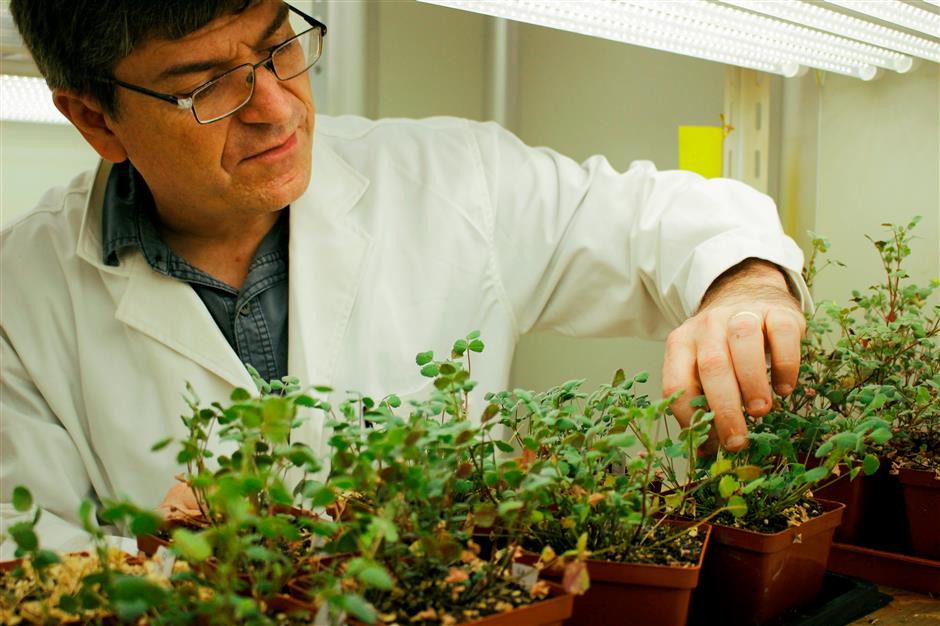
今日上海
加拿大研究员把上海比作科研的天堂 - 2022年10月17日
Canadian researcher hails Shanghai as a paradise for scientific research
Jeremy Murray doesn't speak Chinese, but that didn't stop him from settling down in China. It was a risky maneuver, but he pulled it off.
"Not a word of Chinese. But I function well here in Shanghai," said the 51-year-old Canadian scientist.
Like the majority of Chinese people, he is heavily reliant on WeChat, China's most popular messaging app, with approximately 1.3 billion monthly active users.
"I can't live without WeChat," he said. As the lingering pandemic disrupted his travel plans, he created a long list of WeChat groups to assign homework, hold scholarly debates, and communicate with his overseas friends and family members, particularly his elderly mother.
Fortunately, Murray can find a cure for his homesickness here in Shanghai, which he describes as "perhaps the most international of all the big cities in China."
"There's a lot of attractive foodstuffs that you can get here because that's one thing people miss when you're away from your country. You miss the familiar food, so although I love Chinese food, it's nice to have other options," he said.
He used himself as an example, saying, "I'm from Canada, and it's nice for me to see there are a lot of these Canadian coffee shops like Tim Hortons appearing in the city. It's a little thing, but it's still kind of a welcoming nice thing for me."
Murray began in Canada before moving to the United States. He then moved to the United Kingdom to work at the John Innes Centre, a world-renowned plant and microbial science research institute. He made the decision to pursue his research in Shanghai about five years ago.
"I was looking to expand my lab," he explained.

Canadian researcher Jeremy Murray works at his greenhouse.
At the time, he was offered a position at the CAS-JIC Centre of Excellence for Plant and Microbial Science, a new joint research institute co-founded by JIC and the Chinese Academy of Sciences. The joint institute was established in Shanghai at the CAS Center for Excellence in Molecular Plant Science.
"I have to say I feel like it's been a great success," he said. "I've been able to expand my group. There are 13 of us now, including me, which would have been very difficult to do where I was in the UK.
"A lot of papers were published here. Previously, I would do well if I published two manuscripts a year. Last year, we published 10. And we've had a few big stories come out of our lab. We published a paper in Science about how plants fix nitrogen."
Shanghai, in his opinion, is a kind of paradise for scientific research.
"I don't think you can get better," he said, giving an "A" for the city's scientific research environment. "We've got fantastic facilities here. We've also got a great team of scientists. There are a lot of people doing cutting-edge research here. So you can sit down at the canteen and discuss science with some of the leading researchers in the world."
Murray admits that his success would not have been possible without the support of his employer and the Shanghai government.
"I feel very supported," he said. "Like I've got supplements to help my rental here, which is a big issue in Shanghai for scientists."
But he said the high cost of living can be offset by some programs that are available in Shanghai.
When he compared Shanghai to other top labs where he had previously worked, he was impressed.
"I have to say in terms of being able to obtain funding, the personnel, the people, it's been easier here," he said. "We have a clear advantage here where we can build a bigger team faster and with enough research funding to take on ideas that come to me. So that was often a constraint in other places that I've been. In that sense, it's very liberating and we can really plot our own research directions, and that's a good feeling."
He also values Shanghai's frequent international collaboration. Despite the fact that COVID-19 has significantly hampered his progress, he remains optimistic about the future.
"There was momentum in that direction," he said of international cooperation in Shanghai and China. "Things are just put on hold for a while because of the situation. I think there are many steps being taken in that direction."
Essentially, Shanghai is a draw for foreigners like Murray. Around 10 percent of the researchers at the institute where he now works are foreigners from countries such as Spain and Greece.
"Shanghai has so many different international cultural things available. I think that's part of the reason it is so attractive," he said. "Also, it's just a great city. It's got a fantastic subway system. There are lots of attractive sites, like big skyscrapers with lights. It's just an exciting city to be in."
Murray enjoys walking down The Bund and seeing the sights, but he especially enjoys the Shanghai Botanical Garden.
"I think that's really a world-class facility. I was able to attend a concert, a fantastic outdoor concert with perfect weather and great music in a beautiful setting," he said.
The ever-changing Shanghai continues to attract foreigners.
"I generally enjoy Chinese food. What I enjoy is that you can sit down to any meal at any time and you might find a completely new dish. So I think it's sort of endlessly inventive and there's always a surprise on the table. I like that," Murray said, admitting, however, that his favorite was xiaolongbao (steamed buns).
Source: Shanghai Daily

